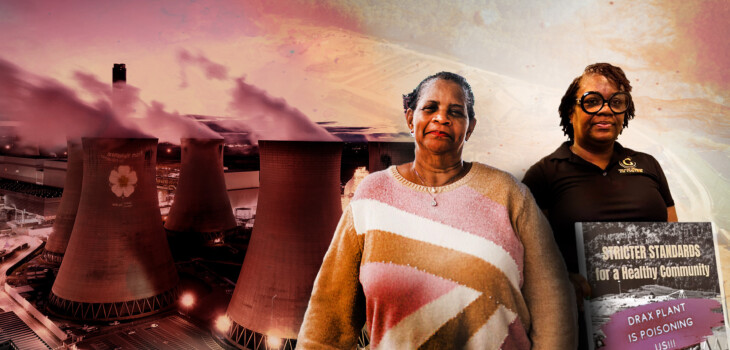Drax, the “corporate assassins” still lobbying for billions in subsidies

Drax likes to cast itself as a green champion – Britain’s largest power station has ditched coal and now runs on allegedly ‘sustainable’ wood pellets. But scratch beneath the branding and a different story emerges: one of transatlantic forest destruction, community devastation, and deceptive climate maths propped up by billions in UK public subsidies.
In this podcast, Dr Krystal Martin and Kathy Egland share the truth about the true cost of Drax’s profiteering in Gloster, Mississippi, where the company manufactures wood pellets. Their voices shine light on the ways Drax is fuelling “environmental racism”, “pimping poverty’ and the reality of life for a small Black community living in the shadows of Drax’s toxic dust and smog.
Listen here:
Community power
The idea sounds simple: trees grow back, so burning wood is carbon neutral. In reality, vast quantities of carbon released at Drax’s stacks instantly enters the atmosphere, while tree regrowth takes decades, time the planet doesn’t have. Drax is the UK’s “single largest carbon emitter and the biggest tree burner in the entire world”. Investigations have repeatedly shown that Drax’s pellets don’t just come from sawdust and offcuts, but from clear-cut, biodiverse forests in the US, Canada and Estonia. These concerns, coupled with the relatively high cost of biomass power compared to other renewables, have fuelled controversy about its climate value. The image Drax tries to push is the epitomé of greenwash.
Communities near Drax’s US pellet mills in Gloster, Mississippi, know this reality first-hand. Gloster is a predominantly Black community, where at least 32% of the population lives below the poverty line. Drax operates the Amite BioEnergy plant, which has become a flashpoint for local resistance after years of relentless toxic air, dust and noise pollution. The facility has already incurred millions in fines for violating air pollution standards. But when Drax sought to allow even higher emissions, locals pushed back – and won.
In April 2025, Mississippi regulators rejected Drax’s bid to reclassify the site as a “major” polluter, a move that would have allowed higher emissions. It was a rare example of community groups standing up to a multinational and pushing for a public health and environmental justice victory. However, on 14 October 2025, Drax is seeking to overturn this victory. An open letter to the permit board, signed by 85 global signatories, outlines why Drax must be stopped. Egland and Martin’s truth is more important now than ever.
The great subsidy farce
Meanwhile, in the UK, government money keeps flowing. Drax’s subsidies, worth billions, are due to expire in 2027. Instead of winding down, the government has offered a new ‘bridging’ package to 2031. By then, Drax will have received between £11-£12bn in subsidies. This is despite the fact that the company’s 2024 revenue was £6,163m, which enabled shareholder payouts of £93.5m and a chunky £2,864,000 remuneration package for CEO Will Gardiner. Yet this mega polluter has also incurred over £127m in fines in both the US and UK, and hounded whistleblower Rowaa Ahmar through the courts for daring to speak out.
And Drax is pushing hard for an even bigger prize: bioenergy with carbon capture and storage (BECCS). It has consent for BECCS at two plants, but is pushing for further subsidies to make it viable. Initially estimated to cost UK energy bill payers £31.7bn over 25 years, this could now rise to over £43bn because of the rising cost of wood pellets. Analysts doubt it can deliver real negative emissions at a reasonable cost. The promise of sucking carbon from the air is seductive, but experts warn it’s an expensive gamble with little proof it can deliver negative emissions at scale. Still, Drax continues to lobby for a long-term carbon-removals revenue stream – at taxpayers’ expense. It’s worth noting, too, that Gardiner is also Executive Chair of Elimini, Drax’s new carbon capture subsidiary.
Drax, the UK’s top polluter
The UK has been patting itself on the back for phasing out coal. Yet a recent report from consultancy group Ember reveals that Drax is still the UK’s top polluter, by a wide margin. In 2024, it pumped out 13.3 million tonnes of carbon dioxide, 16% more than the previous year. That’s more than the combined emissions of the UK’s six largest gas power stations.
Now, even investors are asking questions. In August, the Financial Conduct Authority launched a formal investigation into whether Drax misled shareholders about its sourcing of wood pellets in reports covering 2021–2023. The announcement triggered a sharp fall in the company’s share price and renewed public scrutiny of its environmental claims. If the company can’t convince its own backers, why should the public keep footing the bill?
In short, Drax’s biomass expansion is dangerous. It’s destroying lives and communities to manufacture pellets whilst raking in billions in UK public money for a ‘carbon-neutral’ sham with persistently massive emissions. The government has doubled down on a flawed experiment in biomass, rather than investing public money into renewables. It’s time to rethink subsidies, close loopholes, and invest in truly clean, verifiable energy sources.
Opposition rising
But opposition is growing. In the UK, groups such as Axe Drax, the Stop Burning Trees Coalition, Biofuelwatch, and Reclaim the Power have disrupted shareholder meetings and staged demonstrations at Parliament. In the US, groups including Dogwood Alliance and Healthy Gulf join with community organisations to highlight the forest destruction and pollution linked to pellet mills.
Campaigns are united around a simple point: burning trees is no solution to the climate crisis, it’s costly, destructive and damaging. The myth of Drax’s green halo is crumbling; these campaign groups are powerful and absolutely vital.
Huge thanks to Marsh House Studio for editing this podcast.
Read a transcript of the podcast here: Drax transcript
